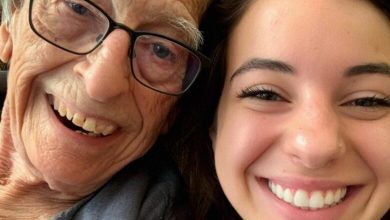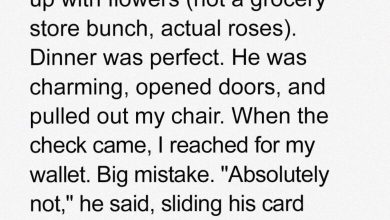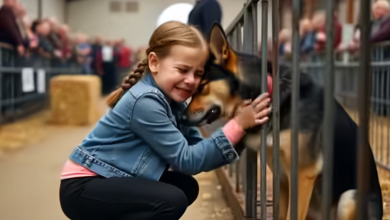
“A Life-Altering Choice: A Heartfelt Story After 30 Years of Marriage”
The morning that should have marked our thirtieth wedding anniversary, I did something even I hadn’t fully pictured until the words slipped out: I told Zack I wanted a divorce.
To him, it was like lightning from a clear sky. His face went pale, as though the floor had shifted beneath him. But for me, the decision hadn’t come suddenly. It had been forming quietly over years—a persistent ache I numbed with routine, responsibilities, and the busyness of family life. When our youngest finally moved out and the house grew quiet, there was nothing left to mask the truth.
I wasn’t leaving because of infidelity or cruelty. Zack wasn’t a villain. He was dependable, loyal, and reliable. But for decades, he had been emotionally absent. Not unkind—just distant. In my hardest moments, he was there physically but never in spirit. I’d rock feverish babies through the night while he slept. When my father passed away, he offered a perfunctory hug before turning back to the TV. When the pressures of work and motherhood weighed me down, he brushed off my exhaustion. Every time I asked for connection—for conversation, counseling, or change—he shrugged and said, “Nothing’s wrong.”
But something was wrong.
Loneliness can thrive even in a shared bed, even in a home full of memories. I told myself to be patient, to be grateful, to maintain peace for the kids. I convinced myself that emotional connection wasn’t everything, that his quiet wasn’t neglect. But once the house emptied, I couldn’t ignore it any longer: I had become a background character in my own life. And if I didn’t act, I would slowly disappear.
That morning, I sat Zack down at the kitchen table—the same table where we’d shared countless quiet dinners—and spoke the truth.
He asked if there was someone else. There wasn’t. He asked if he’d done something unforgivable. He hadn’t. I said the hardest words I’ve ever spoken:
“You weren’t there. And I can’t keep living a life where I’m always alone beside someone.”
He didn’t argue or cry. He simply looked stunned. Maybe, for the first time, he realized I wasn’t angry—I was empty. And emptiness doesn’t appear overnight.
Within a month, I moved into a small, sunlit apartment. It wasn’t extravagant, but it felt like breathing. For the first time in years, my surroundings reflected what I craved inside: space, light, freedom. I bought a secondhand bike and rode it to work. I joined a pottery class. I walked along the beach at dusk, letting the waves drown out the silence I had feared.
I hadn’t realized how small I’d made myself until I started stretching again.
My children noticed first. On video calls, they kept saying, “Mom, you look happy.” And I was. Not because leaving was painless, or because thirty years of marriage had lost value, but because I finally belonged to myself again.
Zack struggled. He called occasionally, confused and apologetic in ways I hadn’t heard before. I felt compassion—but I also knew returning would only revive the same quiet ache: him distant, me invisible.
Six months after the divorce, I met Sam.
There was no instant spark, no sweeping romance. Just steady warmth, like sunlight through a window. Sam listened. He asked questions. He remembered the little things. He didn’t try to fix me—he wanted simply to know me. At first, it felt strange to be seen so clearly. But it was also healing, like waking after years of sleepwalking.
With him, I learned what it means to be in a relationship where both people show up. Not perfectly, not without flaws—but fully.
We spoke about the future slowly, gently. For the first time in years, sharing a life didn’t feel like a burden. It felt like hope.
Looking back on my life with Zack, I feel no regret. That life gave me children I adore, lessons I carry, and strength I didn’t know I possessed. But staying would have meant sacrificing the second half of my life to preserve the first. And I couldn’t do that.
Leaving was the hardest thing I’ve ever done. It was also the bravest.
If there’s one message I hope other women hear: sometimes the life you’ve built isn’t the one you’re meant to keep. Love can fade into habit, habit into silence, silence into erasure of self. You don’t need permission to want more. You don’t need to apologize for choosing yourself. That choice is not selfish—it’s sacred.
Now, I wake to sunlight pouring through my windows. I brew my coffee and step onto my balcony, inhaling the ocean air. Some mornings, I still mourn the woman I was—the one who tried so hard to make it work. But then I remember the woman I am now: grounded, open, becoming.
The life I left behind taught me endurance.
The life I’m building now teaches me to live.
And choosing joy, after thirty years of quiet survival, brought me home—to myself.




